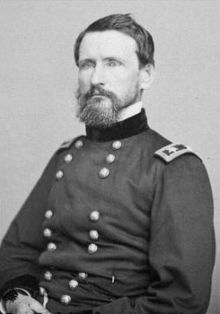John J. Peck
| John James Peck | |
|---|---|

John J. Peck
|
|
| Born |
January 4, 1821 Manlius, New York |
| Died | April 21, 1878 (aged 57) Syracuse, New York |
| Place of burial | Oakwood Cemetery, Syracuse, New York |
| Allegiance |
United States of America Union |
| Service/branch |
United States Army Union Army |
| Years of service | 1843–1853, 1861–1865 |
| Rank |
|
| Commands held | Army of North Carolina |
| Battles/wars | American Civil War |
John James Peck (January 4, 1821 – April 21, 1878) was a United States soldier who fought in the Mexican-American War and American Civil War.
Peck was born on January 4, 1821 in Manlius, New York. His father, John W. Peck, who had served in the War of 1812, was among the earliest and most active settlers of Onondaga County. The family home was at 312 Seneca Street, Manlius and is one of the oldest residences in Manlius village, having been built by Finley McLaren prior to 1807. Today the home is marked by a New York State Education Department historic marker commemorating it as the birthplace of Gen. John J. Peck. His mother was Phebe Peck.
Peck entered the United States Military Academy at age 18 and graduated eighth from a class of 39 on July 1, 1843 along with Ulysses S. Grant and many other soon to be famous military officers. He served in the artillery as a second lieutenant and was stationed in New York until 1845.
In 1846 he was promoted second lieutenant and fought in Zachary Taylor's Army of Occupation during the battles of Palo Alto, Resaca de la Palma and Monterrey. He then joined Winfield Scott's army and landed at Vera Cruz and fought in all the battles of Scott's campaign culminating in the fall of Mexico City. He was brevetted captain for gallantry and meritorious conduct in the battles of Contreras and Churubusco and again brevetted to major for his services at the battle of Molino del Rey and received the praise of his division commander, William J. Worth. Prior to the outbreak of the Civil War he was said to have been an intimate friend of Generals Robert E. Lee, Joseph E. Johnston and P. G. T. Beauregard.
...
Wikipedia
